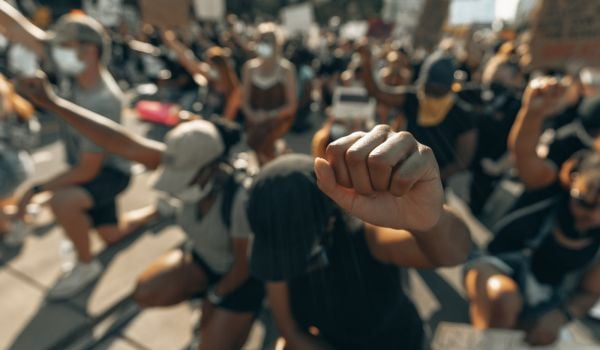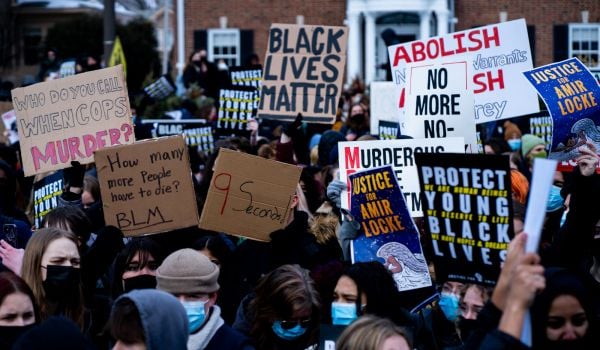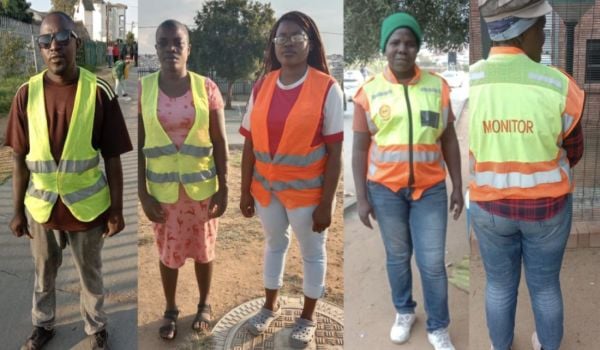By Sunday, nearly 4,000 people in northern New Jersey will have new lives. Their numbers will add to the 13,000 before them in New Jersey who were able to clear their non-violent criminal history in one fell swoop through an innovative program called Fugitive Safe Surrender. Standing in line for hours in a light rain in front of the Jersey City Armory, hundreds came to answer to outstanding warrants, having heard about the program through Facebook postings, newspaper ads and word of mouth.
“I had every doubt in the world. I thought I would come in and go out in handcuffs,” said Ed Restrepo, an Iraq War veteran from West New York, N.J. He ended up settling outstanding warrants for nearly 200 driving and parking violations, he said, dating back to when he was homeless and living out of his car. The day after he was cleared by the temporary courts set up in Jersey City’s Armory, he came back to volunteer.
“Everything got lifted off my shoulders,” he said. Next week, Restrepo plans to take a civil service test as a step on the way to becoming a police officer. Trying out for the job was impossible without first clearing his record.
Restropo’s experience, while striking, is not out of the ordinary among participants of the six-year-old program. Only 1 percent of surrendering fugitives end up facing jail time. Most get negotiated fines or some combination of payment plans, dropped charges and community service.
A whopping 90 percent of the outstanding warrants handled by the program are for civil violations such as Mr. Restrepo’s. These include unpaid fines, unpaid traffic tickets, failure to appear in court and failure to pay for child support. A collaboration between the US Marshals, religious organizations, local courts and the state attorney general’s office, Fugitive Safe Surrender started in Cleveland in 2005, after a US Marshal was shot and killed during a routine traffic stop of someone with an outstanding warrant. The federal criminal justice agency hoped a safe surrender program for non-violent criminals would discourage that kind of escalation of violence.
But observers quickly realized that the program helped the courts in more ways than just increasing safety for marshals. It also freed overburdened courts to pursue higher-priority cases.
New Jersey’s attorney general’s office conservatively estimates $500 savings for each person who goes through the process. It starts with a church, to give participants a sense of sanctuary, and ends with a judge drawn from nearby counties. Fugitives get a court-appointed lawyer, as well as a chance to sign up for the Affordable Care Act, library cards and other social services while they wait. New Jersey Acting Attorney General John J. Hoffman has called this program one-stop shopping for a new life, according to Neal Bucchino, a spokesperson for New Jersey’s program.
New Jersey, which has hosted the program in five cities since 2008, has broken all records. While hundreds showed up in places such as Indianapolis and Akron, 1,165 men (and a handful of women) came to the Armory Wednesday, the first day of the Jersey City iteration. Jamaal Brown stood in the rain to clear old tickets. Brown said his friends who had come the previous encouraged him to show up. No arrests were made, said Rich Rivera of the Latino Leadership Alliance. “Yesterday’s numbers alone exceeded any one day total anywhere,” he said. “The word is out. The program has credibility.”
Bucchino also told the story of a grandmother who cleared her warrants due to unpaid parking tickets yesterday. This allowed her to begin the process of claiming a grandchild currently under the care of Division of Children and Families. “We are happy to be a part of the program,” said Jersey City Mayor Steven Fulop. “This program saves all taxpayers money, as, rather than locking up non-violent offenders in an expensive jail system, we offer a pathway for non-violent offenders to move forward in a legal way to be productive contributors to society.”
The program’s continuance is not assured, though, since each four-day iteration depends on the attorney general’s office initiation, the coordination of more than a dozen agencies and creative funding. When Congress authorized the program in 2006, it provided no funding. The US Marshals administer it, but no longer fund it, according to a new book on the program, and money comes from grants, benefactors and creative sources. In New Jersey, for instance, the program costs come from forfeiture money, from other civil or criminal defendants found guilty in court.
Even finding a site in crowded north Jersey was tough. The Armory is large enough, and conveniently located across the street from the Evangelismos Greek Orthodox Church. The program has clear public safety benefits for high-poverty neighborhoods where many have outstanding tickets because they simply can’t pay or miss court dates because they can’t get there. Like restorative justice, forgiving a misdemeanor or felony doesn’t mean forgetting, but becomes a process of negotiation, the very definition of a civil society.

Carly Berwick writes about education and culture for Next City, as well as The New York Times, ARTnews, and other publications.

_920_690_80.jpg)














